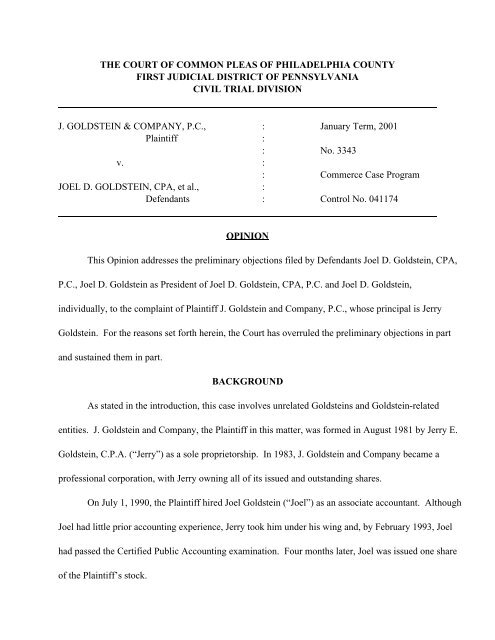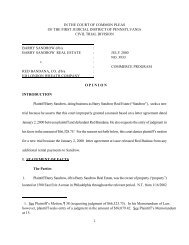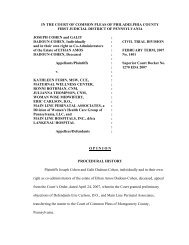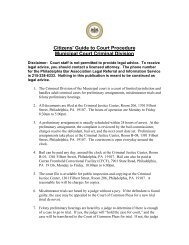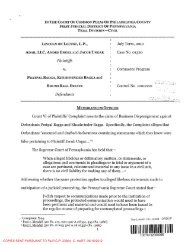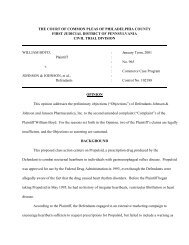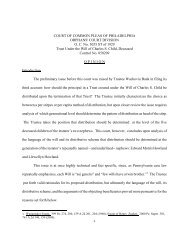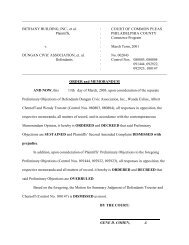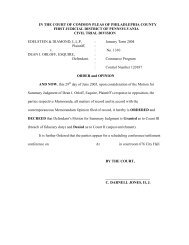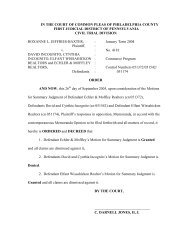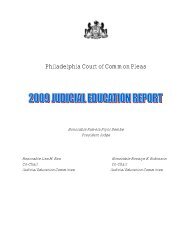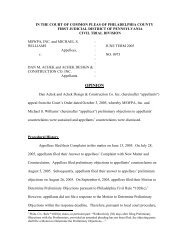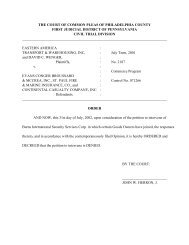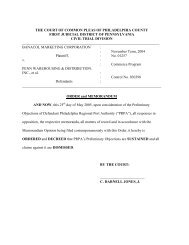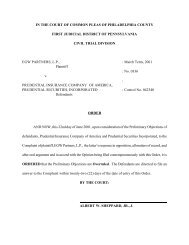J. Goldstein & Company, P.C. vs Joel D. Goldstein, CPA, et al. - The ...
J. Goldstein & Company, P.C. vs Joel D. Goldstein, CPA, et al. - The ...
J. Goldstein & Company, P.C. vs Joel D. Goldstein, CPA, et al. - The ...
Create successful ePaper yourself
Turn your PDF publications into a flip-book with our unique Google optimized e-Paper software.
THE COURT OF COMMON PLEAS OF PHILADELPHIA COUNTY<br />
FIRST JUDICIAL DISTRICT OF PENNSYLVANIA<br />
CIVIL TRIAL DIVISION<br />
J. GOLDSTEIN & COMPANY, P.C., : January Term, 2001<br />
Plaintiff :<br />
: No. 3343<br />
v. :<br />
: Commerce Case Program<br />
JOEL D. GOLDSTEIN, <strong>CPA</strong>, <strong>et</strong> <strong>al</strong>., :<br />
Defendants : Control No. 041174<br />
OPINION<br />
This Opinion addresses the preliminary objections filed by Defendants <strong>Joel</strong> D. <strong>Goldstein</strong>, <strong>CPA</strong>,<br />
P.C., <strong>Joel</strong> D. <strong>Goldstein</strong> as President of <strong>Joel</strong> D. <strong>Goldstein</strong>, <strong>CPA</strong>, P.C. and <strong>Joel</strong> D. <strong>Goldstein</strong>,<br />
individu<strong>al</strong>ly, to the complaint of Plaintiff J. <strong>Goldstein</strong> and <strong>Company</strong>, P.C., whose princip<strong>al</strong> is Jerry<br />
<strong>Goldstein</strong>. For the reasons s<strong>et</strong> forth herein, the Court has overruled the preliminary objections in part<br />
and sustained them in part.<br />
BACKGROUND<br />
As stated in the introduction, this case involves unrelated <strong>Goldstein</strong>s and <strong>Goldstein</strong>-related<br />
entities. J. <strong>Goldstein</strong> and <strong>Company</strong>, the Plaintiff in this matter, was formed in August 1981 by Jerry E.<br />
<strong>Goldstein</strong>, C.P.A. (“Jerry”) as a sole propri<strong>et</strong>orship. In 1983, J. <strong>Goldstein</strong> and <strong>Company</strong> became a<br />
profession<strong>al</strong> corporation, with Jerry owning <strong>al</strong>l of its issued and outstanding shares.<br />
On July 1, 1990, the Plaintiff hired <strong>Joel</strong> <strong>Goldstein</strong> (“<strong>Joel</strong>”) as an associate accountant. Although<br />
<strong>Joel</strong> had little prior accounting experience, Jerry took him under his wing and, by February 1993, <strong>Joel</strong><br />
had passed the Certified Public Accounting examination. Four months later, <strong>Joel</strong> was issued one share<br />
of the Plaintiff’s stock.
Around this time, the Plaintiff and <strong>Joel</strong> <strong>al</strong>legedly entered into an or<strong>al</strong> agreement under which<br />
<strong>Joel</strong> would endeavor to solicit clients for the Plaintiff (“Agreement”). Although the Plaintiff would bill<br />
and collect fees from such clients, it would pay <strong>Joel</strong> 50 percent of <strong>al</strong>l gross revenue collected from<br />
them. <strong>Joel</strong>’s payment rights under the Agreement were in addition to his base s<strong>al</strong>ary. 1<br />
In November 2000, <strong>Joel</strong> secr<strong>et</strong>ly formed “<strong>Joel</strong> D. <strong>Goldstein</strong>, C.P.A., P.C. (“<strong>Joel</strong>’s Firm”) and<br />
supposedly began luring the Plaintiff’s clients. According to the Complaint, many of these clients had<br />
longstanding relationships with the Plaintiff and Jerry, and terminated these relationships due to <strong>Joel</strong>’s<br />
enticements. As part of his efforts, <strong>Joel</strong> <strong>al</strong>legedly copied the Plaintiff’s files relating to particular clients,<br />
as well as the Plaintiff’s entire customer list, and used the Plaintiff’s tax preparation software in his work<br />
at his Firm.<br />
On December 13, 2000, <strong>Joel</strong> informed Jerry that he was terminating his employment with the<br />
Plaintiff. <strong>Joel</strong>’s last day of employment with the Plaintiff was December 22, 2000. Jerry subsequently<br />
discovered <strong>Joel</strong>’s supposed duplicity and has filed a complaint against him (“Complaint”). In the<br />
Complaint, Jerry asserts causes of action for breach of contract, intention<strong>al</strong> interference with contractu<strong>al</strong><br />
relations, conversion, trespass to chattel, breach of duty of loy<strong>al</strong>ty, breach of fiduciary duty, unjust<br />
2<br />
enrichment and trade secr<strong>et</strong>s. In response, the Defendants have filed preliminary objections asserting<br />
1 <strong>The</strong> Complaint <strong>al</strong>so asserts that the Plaintiff issued one share of stock to Thomas Yager,<br />
C.P.A. (“Yager”), another accounting associate with the Plaintiff, on January 1, 1995.<br />
2 Jerry’s claims for intention<strong>al</strong> interference with contractu<strong>al</strong> relations and trade secr<strong>et</strong>s are<br />
asserted against <strong>al</strong>l three Defendants. <strong>The</strong> remaining claims are asserted against <strong>Joel</strong> as an individu<strong>al</strong><br />
only.<br />
2
leg<strong>al</strong> insufficiency, failure to attach a writing, insufficient specificity and inclusion of scand<strong>al</strong>ous and<br />
impertinent matter.<br />
DISCUSSION<br />
<strong>The</strong> Plaintiff’s claims for breach of contract and conversion are leg<strong>al</strong>ly insufficient, and the<br />
Objections ther<strong>et</strong>o are sustained. <strong>The</strong> remaining Objections are without merit and are overruled.<br />
I. <strong>The</strong> Plaintiff’s Claims for Intention<strong>al</strong> Interference with Contractu<strong>al</strong> Relations,<br />
Breach of Fiduciary Duty and Unjust Enrichment Are Leg<strong>al</strong>ly Sufficient, While its Claims<br />
for Breach of Contract and Conversion Are Not<br />
<strong>Joel</strong> first ch<strong>al</strong>lenges the leg<strong>al</strong> sufficiency of the Plaintiff’s claims for breach of contract,<br />
intention<strong>al</strong> interference with contractu<strong>al</strong> relations, conversion, breach of fiduciary duty and unjust<br />
enrichment. When a court is presented with preliminary objections asserting leg<strong>al</strong> insufficiency,<br />
[I]t is essenti<strong>al</strong> that the face of the complaint indicate that its claims may not be<br />
sustained and that the law will not permit recovery. If there is any doubt, it should be<br />
resolved by the overruling of the demurrer. Put simply, the question presented by<br />
demurrer is wh<strong>et</strong>her, on the facts averred, the law says with certainty that no recovery<br />
is possible.<br />
Bailey v. Storlazzi, 729 A.2d 1206, 1211 (Pa. Super. Ct. 1999). For the purposes of reviewing the<br />
leg<strong>al</strong> sufficiency of a complaint, “<strong>al</strong>l well-pleaded materi<strong>al</strong>, factu<strong>al</strong> averments and <strong>al</strong>l inferences fairly<br />
deducible therefrom” are presumed to be true. Tucker v. Philadelphia Daily News, 757 A.2d 938,<br />
941-42 (Pa. Super. Ct. 2000).<br />
A. Breach of Contract<br />
To establish a claim for breach of contract, a claimant must show “(1) the existence of a<br />
contract, including its essenti<strong>al</strong> terms, (2) a breach of a duty imposed by the contract and (3) resultant<br />
damages.” CoreStates Bank, N.A. v. Cutillo, 723 A.2d 1053, 1058 (Pa. Super. Ct. 1999) (citation<br />
3
omitted). In the instant matter, the Plaintiffs breach of contract claim arises from <strong>Joel</strong>’s <strong>al</strong>leged breach<br />
of the Agreement.<br />
<strong>The</strong> Plaintiff describes the Agreement as follows:<br />
J. <strong>Goldstein</strong> and <strong>Company</strong> entered into a verb<strong>al</strong> employment agreement with <strong>Joel</strong><br />
<strong>Goldstein</strong> whereby, in addition to his full time employment and base s<strong>al</strong>ary, <strong>Joel</strong> <strong>Goldstein</strong><br />
would endeavor to bring tax and accounting clients to J. <strong>Goldstein</strong> and <strong>Company</strong>. J.<br />
<strong>Goldstein</strong> and <strong>Company</strong> would bill and collect one hundred (100%) percent of the gross<br />
revenue generated from said clients and the [sic] pay to <strong>Joel</strong> <strong>Goldstein</strong> fifty (50%) percent<br />
of said gross revenue.<br />
Complaint at 12. According to the Complaint, <strong>Joel</strong> breached the Agreement in the following ways:<br />
a. by person<strong>al</strong>ly providing tax and accounting services to clients and receiving<br />
revenue therefrom, without the knowledge and permission of J. <strong>Goldstein</strong> and <strong>Company</strong>;<br />
b. by not providing J. <strong>Goldstein</strong> and <strong>Company</strong> with one hundred (100%) percent of<br />
the gross revenue generated from these clients (an[d] then being paid fifty (50%) percent);<br />
and<br />
c. by not working full time for J. <strong>Goldstein</strong> and <strong>Company</strong>.<br />
Complaint at 27.<br />
Even assuming the Complaint’s <strong>al</strong>legations are true, the Plaintiff does not <strong>al</strong>lege a compl<strong>et</strong>e<br />
claim for breach of contract. <strong>The</strong> only action demanded of <strong>Joel</strong> in the Agreement is that he solicit<br />
clients for the Plaintiff. <strong>The</strong> language of the agreement does not include a contractu<strong>al</strong> prohibition on him<br />
soliciting his own clients, r<strong>et</strong>aining fees paid by such clients or working less than full time. Because there<br />
is no assertion that <strong>Joel</strong> failed to endeavor to solicit clients for the Plaintiff, the Court cannot conclude<br />
that <strong>Joel</strong> breached the Agreement. Thus, the Plaintiff cannot sustain a cause of action for breach of<br />
contract.<br />
4
Attempting to bolster its arguments, the Plaintiff asserts that its breach of contract claim is v<strong>al</strong>id<br />
because, “[u]nder Pennsylvania law, an employee cannot comp<strong>et</strong>e with his [sic] employer.” Plaintiff’s<br />
Memorandum at 6. See <strong>al</strong>so SHV Co<strong>al</strong>, Inc. v. Continent<strong>al</strong> Grain Co., 376 Pa. Super. 241, 249, 545<br />
A.2d 917, 920-21 (1988) (concluding that the defendant diverted business from employer to<br />
comp<strong>et</strong>itor during his term of employment), rev’d on other grounds, 526 Pa. 489, 587 A.2d 702<br />
(1991). An employee’s comp<strong>et</strong>ition with his or her employer, however, does not give rise to a breach<br />
of contract claim. See Spring Steels, Inc. v. Molloy, 400 Pa. 354, 162 A.2d 370 (1960) (weighing<br />
employee’s comp<strong>et</strong>ition as a claim for unfair comp<strong>et</strong>ition); SHV Co<strong>al</strong>, Inc., 376 Pa. Super. 241, 545<br />
A.2d 917 (treating former employer’s claim as breach of fiduciary duty/duty of loy<strong>al</strong>ty claim). As a<br />
result, the Complaint does not <strong>al</strong>lege facts to support a breach of contract claim, and the claim must be<br />
dismissed.<br />
elements:<br />
B. Intention<strong>al</strong> Interference with Contractu<strong>al</strong> Relations<br />
A successful claim for intention<strong>al</strong> interference with contractu<strong>al</strong> relations must satisfy four<br />
(1) the existence of a contractu<strong>al</strong>, or prospective contractu<strong>al</strong> relation b<strong>et</strong>ween the<br />
complainant and a third party; (2) purposeful action on the part of the defendant,<br />
specific<strong>al</strong>ly intended to harm the existing relation, or to prevent a prospective relation<br />
from occurring; (3) the absence of privilege or justification on the part of the defendant;<br />
and (4) the occasioning of actu<strong>al</strong> leg<strong>al</strong> damage as a result of the defendant’s conduct.<br />
Strickland v. University of Scranton, 700 A.2d 979, 985 (Pa. Super. Ct. 1997) (citation omitted).<br />
elusive:<br />
<strong>The</strong> definition of “privilege” in the context of a claim for intention<strong>al</strong> interference has proven<br />
5
3 <strong>The</strong>se sections address intention<strong>al</strong> interference with performance of contract by a third party,<br />
intention<strong>al</strong> interference with another’s performance with his own contract and intention<strong>al</strong> interference<br />
with prospective contractu<strong>al</strong> relations.<br />
factors:<br />
Unlike other intention<strong>al</strong> torts such as intention<strong>al</strong> injury to person or property or<br />
defamation, this branch of tort law has not developed a cryst<strong>al</strong>lized s<strong>et</strong> of definite rules<br />
as to the existence or non-existence of a privilege to act in the manner stated in<br />
[Restatement (Second) of Torts] §§ 766, 766A or 766B. 3<br />
Ruffing v. 84 Lumber Co., 410 Pa. Super. 459, 468, 600 A.2d 545, 549 (1992) (quoting Adler,<br />
Barish, Daniels, Levin & Creskoff v. Epstein, 482 Pa. 416, 433 n.17, 393 A.2d 1175, 1184 n.17<br />
(1978), and Restatement (Second) of Torts § 767 cmt. b). Because of this, Pennsylvania courts have<br />
held that “the absence of privilege or justification on the part of the defendant is merely another way of<br />
stating that the defendant’s conduct must be improper.” Cloverleaf Dev., Inc. v. Horizon Fin. F.A.,<br />
347 Pa. Super. 75, 83, 500 A.2d 163, 167 (quoting Yaindl v. Ingersoll-Rand Co. Standard<br />
Pump-Aldrich Div., 281 Pa. Super. 560, 581 n.11, 422 A.2d 611, 622 n.11 (1980)) (quotation marks<br />
omitted). See <strong>al</strong>so Adler, Barish, Daniels, Levin & Creskoff, 482 Pa. at 433 n.17, 393 A.2d at 1184<br />
n.17 (noting that Restatement (Second) of Torts § 767 “focuses upon wh<strong>et</strong>her conduct is ‘proper,’<br />
rather than ‘privileged’”). 4<br />
4<br />
To d<strong>et</strong>ermine wh<strong>et</strong>her a defendant’s conduct is improper, a court must weigh the following six<br />
(a) the nature of the actor’s conduct;<br />
(b) the actor’s motive;<br />
(c) the interests of the other with which the actor’s conduct interferes;<br />
(d) the interests sought to be advanced by the actor;<br />
(e) the soci<strong>al</strong> interests in protecting the freedom of action of the actor and the<br />
contractu<strong>al</strong> interests of the other;<br />
(f) the proximity or remoteness of the actor’s conduct to the interference; and<br />
(g) the relations b<strong>et</strong>ween the parties.<br />
6
<strong>The</strong> Defendants correctly contend that it is gener<strong>al</strong>ly not improper for a former employee to<br />
solicit a former employer’s clients. Defendants’ Memorandum at 3 (citing Spring Steels, Inc. v.<br />
Molloy, 400 Pa. 354, 162 A.2d 370 (1960)). This, however, does not excuse an employee’s<br />
comp<strong>et</strong>ition with a current employer, which is the situation <strong>al</strong>leged in the Complaint. Complaint at <br />
17-18, 21-22. <strong>The</strong> Defendants’ assertions of propri<strong>et</strong>y and privilege thus are without merit, and their<br />
Objections to the Plaintiff’s intention<strong>al</strong> interference claim is overruled.<br />
C. Conversion<br />
Pennsylvania law defines conversion as “the deprivation of another’s right of property in, or use<br />
or possession of, a chattel, without the owner’s consent and without lawful justification.” Paves v.<br />
Corson, 765 A.2d 1128, 1134 (Pa. Super. Ct. 2000) (citations omitted). <strong>The</strong> Plaintiff’s conversion<br />
claim is based on <strong>Joel</strong>’s possession of funds he received from clients outside of his work with the<br />
Plaintiff, <strong>al</strong>legedly in violation of the Agreement. Because the Plaintiff has not pled a breach of the<br />
Agreement, however, it cannot establish that the Plaintiff had any right to the funds in question.<br />
Accordingly, the Plaintiff’s claim for conversion must be dismissed.<br />
D. Breach of Fiduciary Duty<br />
Under Pennsylvania law, “an agent is subject to a duty not to comp<strong>et</strong>e with the princip<strong>al</strong><br />
concerning the subject matter of the agency” unless otherwise agreed. East & W. Coast Serv. Corp. v.<br />
Papahagis, 344 Pa. 183, 186, 25 A.2d 339, 340 (1942) (quoting Restatement of Agency § 393). See<br />
<strong>al</strong>so SHV Co<strong>al</strong>, Inc. v. Continent<strong>al</strong> Grain Co., 376 Pa. Super. 241, 249, 545 A.2d 917, 920-21<br />
Sm<strong>al</strong>l v. Juniata College, 452 Pa. Super. 410, 418, 682 A.2d 350, 354 (1996) (quoting Restatement<br />
(Second) of Torts § 767).<br />
7
(1988) (liability attached to employee who diverted business from employer to comp<strong>et</strong>itor during his<br />
term of employment), rev’d on other grounds, 526 Pa. 489, 587 A.2d 702 (1991); Levy & Surrick v.<br />
Surrick, 362 Pa. Super. 510, 513-14, 524 A.2d 993, 994 (1987) (quoting Restatement (Second) of<br />
Agency § 393 for the proposition that an agent “is subject to a duty not to comp<strong>et</strong>e with the princip<strong>al</strong><br />
concerning the subject matter of his agency”). This relationship b<strong>et</strong>ween agent and princip<strong>al</strong> has been<br />
described as being fiduciary in nature. Onorato v. Wissahickon Park, Inc., 430 Pa. 416, 423, 244<br />
A.2d 22, 26 (1968) (“to permit [an agent] to be placed in a position where he inevitably must be<br />
subjected to the demands of conflicting duties is not only harmful to the business in which he is engaged,<br />
but <strong>al</strong>so against sound mor<strong>al</strong>s and public policy”).<br />
In his memorandum, <strong>Joel</strong> argues that no fiduciary relationship arises from his ownership of the<br />
Plaintiff’s stock. Even if this is true, however, his employment and agency relationship with the Plaintiff<br />
gives rise to a separate and distinct fiduciary duty that he is <strong>al</strong>leged to have breached. <strong>The</strong> Objections<br />
to the Plaintiff’s breach of fiduciary duty claim must therefore be overruled. 5<br />
E. Unjust Enrichment<br />
In Count VII, the Plaintiff asserts a claim against <strong>Joel</strong> for unjust enrichment based on <strong>Joel</strong>’s<br />
<strong>al</strong>leged use of the Plaintiff’s accounting software in his new enterprise. <strong>The</strong> elements of a claim for<br />
5 Because the Plaintiff’s fiduciary duty claim is not based on <strong>Joel</strong>’s stock ownership, there is no<br />
need to attach a copy of the stock certificate to the Complaint. See Pa. R. Civ. P. 1019(i) (“[w]hen<br />
any claim or defense is based upon a writing, the pleader sh<strong>al</strong>l attach copy of the writing”). Cf.<br />
DeGenova v. Ansel, 382 Pa. Super. 213, 220, 555 A.2d 147, 150 (1988) (where plaintiff’s claims<br />
were brought in tort, he had no obligation to attach a copy of his insurance agreement to his complaint);<br />
Commonwe<strong>al</strong>th, Dept. of Transp. v. B<strong>et</strong>hlehem Steel Corp., 33 Pa. Commw. 1, 15, 380 A.2d 1308,<br />
1315 (1977) (Pennsylvania Rules of Civil Procedure “only require a document to be attached when it<br />
forms the basis for the claim”).<br />
8
unjust enrichment are “benefits conferred on defendant by plaintiff, appreciation of such benefits by<br />
defendant, and acceptance and r<strong>et</strong>ention of such benefits under such circumstances that it would be<br />
inequitable for defendant to r<strong>et</strong>ain the benefit without payment of v<strong>al</strong>ue.” Wiernik v. PHH U.S.<br />
Mortgage Corp., 736 A.2d 616, 622 (Pa. Super. Ct. 1999), app. denied, 561 Pa. 700, 751 A.2d 193<br />
(2000). See <strong>al</strong>so Gener<strong>al</strong> Casmir Pulaski Bldg. & Loan Ass’n v. Provident Trust Co. of Phila., 338<br />
Pa. 198, 202, 12 A.2d 336, 338 (1940) (“[a] person who has been unjustly enriched at the expense of<br />
another is required to make restitution to the other”). A contractu<strong>al</strong> relationship is not required for an<br />
unjust enrichment claim. Linn<strong>et</strong> v. Hitchcock, 324 Pa. Super. 209, 215 n.3, 471 A.2d 537, 540 n.3<br />
(1984). Although <strong>Joel</strong> does not ch<strong>al</strong>lenge the <strong>al</strong>legations supporting the Plaintiff’s unjust enrichment<br />
claim, he contends that the Complaint does not s<strong>et</strong> forth the damages incurred with adequate specificity.<br />
6<br />
Speci<strong>al</strong> damages, such as damages for unjust enrichment, must be specific<strong>al</strong>ly stated. Pa. R.<br />
Civ. P. 1019(f). See <strong>al</strong>so Harkins v. Zamichieli, 266 Pa. Super. 401, 408, 405 A.2d 495, 499 (1979)<br />
(implying that a failure to plead damages for an unjust enrichment claim specific<strong>al</strong>ly would be grounds<br />
for objection). Gener<strong>al</strong>ly, damages are pled with adequate specificity where they “give the gener<strong>al</strong><br />
d<strong>et</strong>ails of the services rendered, the results accomplished, and the v<strong>al</strong>uation of the tot<strong>al</strong> services.”<br />
Goodrich Amram 2d § 1019(f):9. A request for a more specific pleading of damages “will be denied<br />
where the d<strong>et</strong>ails of items of speci<strong>al</strong> damages, pleaded gener<strong>al</strong>ly, are readily obtainable by discovery.”<br />
Commonwe<strong>al</strong>th ex rel. Milk Mktg. Bd. v. Sunnybrook Dairies, Inc., 29 Pa. Commw. 210, 214, 370<br />
6 Speci<strong>al</strong> damages are “those which are not the usu<strong>al</strong> and ordinary consequences of the wrong<br />
done, but which depend upon speci<strong>al</strong> circumstances.” Parsons Trading Co. v. Dohan, 312 Pa. 464,<br />
468, 167 A. 310, 312 (1933).<br />
9
A.2d 765, 768 (1977). See <strong>al</strong>so Foster v. He<strong>al</strong>th Mark<strong>et</strong>, Inc., 146 Pa. Commw. 156, 161-62, 604<br />
A.2d 1198, 1201 (1992) (overruling objection asserting insufficient specificity where amount of<br />
damages could be obtained through discovery).<br />
While the Complaint does not s<strong>et</strong> forth the exact amount of damages incurred as a result of<br />
<strong>Joel</strong>’s <strong>al</strong>leged misconduct, the Plaintiff maintains that “the information required to c<strong>al</strong>culate the damages<br />
. . . are in the exclusive control of the Defendant <strong>Joel</strong> <strong>Goldstein</strong>.” Plaintiff’s Memorandum at 11. This<br />
information, the Plaintiff argues further, “cannot be ascertained prior to discovery. . . .” Id. On this<br />
basis, the Court must conclude that the request for damages is adequately specific for the time being.<br />
II. <strong>The</strong> Complaint Is Sufficiently Specific<br />
Pennsylvania is a fact-pleading jurisdiction that requires a plaintiff to “identify the materi<strong>al</strong> issues<br />
in the case by succinctly summarizing the materi<strong>al</strong> facts underlying the claim.”<br />
Pontiere v. James Dinert, Inc., 426 Pa. Super. 576, 580, 627 A.2d 1204, 1206 (1993) (citing Sevin v.<br />
Kelshaw, 417 Pa. Super. 1, 611 A.2d 1232 (1992)). To d<strong>et</strong>ermine if a pleading s<strong>et</strong>s forth facts with<br />
adequate specificity, a court must ascertain wh<strong>et</strong>her the <strong>al</strong>legations are “sufficiently specific so as to<br />
enable [a] defendant to prepare [its] defense.” Smith v. Wagner, 403 Pa. Super. 316, 319, 588 A.2d<br />
1308, 1310 (1991) (citation omitted). See <strong>al</strong>so In re <strong>The</strong> Barnes Found., 443 Pa. Super. 369, 381,<br />
661 A.2d 889, 895 (1995) (“a pleading should . . . fully summariz[e] the materi<strong>al</strong> facts, and as a<br />
minimum, a pleader must s<strong>et</strong> forth concisely the facts upon which [a] cause of action is based”).<br />
10
7<br />
<strong>Joel</strong> claims that Paragraph Nine of the Complaint is not sufficiently specific because it does not<br />
include d<strong>et</strong>ails as to “what manner or manners the aforesaid aspects of accounting, as practiced by<br />
plaintiff, distinguish them from any other commonly practiced aspects of accounting . . . .” Defendants’<br />
Memorandum at 6. <strong>The</strong> Court fails to see how this is relevant to the Defendants’ defense preparations. 8<br />
Because <strong>al</strong>legations in the Complaint <strong>al</strong>low the Defendants to prepare a defense to the Plaintiff’s claims,<br />
the Complaint is sufficiently specific, and the Objections asserting otherwise are overruled.<br />
III. No Part of the Complaint Need Be Stricken for Being Scand<strong>al</strong>ous and Impertinent<br />
Under Pennsylvania Rule of Civil Procedure 1028(a)(2), a party may object to a pleading’s<br />
inclusion of “scand<strong>al</strong>ous and impertinent matter.” “Scand<strong>al</strong>ous and impertinent matter” is defined as<br />
“<strong>al</strong>legations . . . immateri<strong>al</strong> and inappropriate to the proof of the cause of action.” Common Cause/Pa.<br />
v. Commonwe<strong>al</strong>th, 710 A.2d 108, 115 (Pa. Commw. Ct. 1998) (citing Department of Envtl.<br />
Resources v. Peggs Run Co<strong>al</strong> Co., 55 Pa. Commw. 312, 423 A.2d 765 (1980)). Pennsylvania courts<br />
have been restrained in striking scand<strong>al</strong>ous and impertinent pleadings, however:<br />
[T]here is some authority for the proposition that, even if the pleading of damages was<br />
impertinent matter, that matter need not be stricken but may be treated as “mere<br />
surplusage” and ignored . . . . Furthermore, the right of a court to strike impertinent matter<br />
should be sparingly exercised and only when a party can affirmatively show prejudice.<br />
7 Paragraph Nine of the Complaint states that Jerry taught <strong>Joel</strong> about his propri<strong>et</strong>ary m<strong>et</strong>hods of<br />
“bank reconciliation, payroll tax preparation, corporate and person<strong>al</strong> tax r<strong>et</strong>urn preparation, organizing<br />
and s<strong>et</strong>ting up clients’ files, indexing work papers, an<strong>al</strong>yzing of gener<strong>al</strong> ledger accounts, preparing<br />
financi<strong>al</strong> statements, pension plans, tax planning for year-end cash basis taxpayers, client scheduling and<br />
client billing.”<br />
8 To the extent that the Defendants are seeking d<strong>et</strong>ails as to the basis for the Plaintiff’s trade<br />
secr<strong>et</strong>s claim, the Court notes that this claim appears to be based on <strong>Joel</strong>’s <strong>al</strong>leged copying of the<br />
Plaintiff’s customer list. See Complaint at 62-65. Even if this were not the case, however,<br />
Paragraph Nine is sufficiently d<strong>et</strong>ailed to <strong>al</strong>low the Defendants to prepare a defense.<br />
11
Commonwe<strong>al</strong>th, Dept. of Envtl. Resources v. Hartford Accident & Indem. Co., 40 Pa. Commw. 133,<br />
137-38, 396 A.2d 885, 888 (1979) (citations omitted).<br />
<strong>The</strong> Defendants argue that the portions of the Complaint <strong>al</strong>leging stock ownership by <strong>Joel</strong> and<br />
Yager are irrelevant and must be stricken. While the Court is unsure of Yager’s relevance, there is no<br />
evidence that these <strong>al</strong>legations prejudice the Defendants in any way. As a result, the Objection is<br />
overruled.<br />
CONCLUSION<br />
<strong>The</strong> Plaintiff’s breach of contract and conversion claims are leg<strong>al</strong>ly insufficient, and the<br />
Objections ther<strong>et</strong>o have been sustained. <strong>The</strong> remaining Objections are without merit and are overruled.<br />
Date: June 14, 2001<br />
12<br />
BY THE COURT:<br />
______________________________<br />
JOHN W. HERRON, JR., J.
THE COURT OF COMMON PLEAS OF PHILADELPHIA COUNTY<br />
FIRST JUDICIAL DISTRICT OF PENNSYLVANIA<br />
CIVIL TRIAL DIVISION<br />
J. GOLDSTEIN & COMPANY, P.C., : January Term, 2001<br />
Plaintiff :<br />
: No. 3343<br />
v. :<br />
: Commerce Case Program<br />
JOEL D. GOLDSTEIN, <strong>CPA</strong>, <strong>et</strong> <strong>al</strong>., :<br />
Defendants : Control No. 041174<br />
ORDER<br />
AND NOW, this 14th day of June , 2001, upon consideration of the Preliminary Objections of<br />
Defendants <strong>Joel</strong> D. <strong>Goldstein</strong>, <strong>CPA</strong>, P.C., <strong>Joel</strong> D. <strong>Goldstein</strong> as President of <strong>Joel</strong> D. <strong>Goldstein</strong>, <strong>CPA</strong>,<br />
P.C. and <strong>Joel</strong> D. <strong>Goldstein</strong>, individu<strong>al</strong>ly, to the Complaint of J. <strong>Goldstein</strong> and <strong>Company</strong>, P.C., and the<br />
Plaintiff’s response ther<strong>et</strong>o, and in accordance with the Memorandum Opinion being filed<br />
contemporaneously with this Order, it is hereby ORDERED and DECREED as follows:<br />
1. <strong>The</strong> Preliminary Objections asserting that the Plaintiff’s claims for breach of contract<br />
and conversion are leg<strong>al</strong>ly insufficient are SUSTAINED;<br />
2. <strong>The</strong> remaining Preliminary Objections are OVERRULED; and<br />
3. <strong>The</strong> Plaintiffs are directed to file an amended complaint within twenty days of the date<br />
of entry of this Order.<br />
BY THE COURT:<br />
______________________________<br />
JOHN W. HERRON, J.


